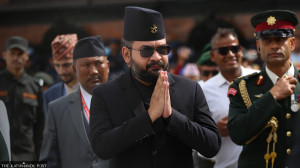Fiction Park
Happiness and trepidation
She was dying.
Kumar Sharma
“She suffers from ALS. She will slowly lose control over her muscle movements because of the progressive neurodegenerative nature of the disease. At the latter stages of life, she will be totally paralysed,” the doctor continued, leaving me in further helplessness. “Sad thing, but there is no sure-shot cure to the ailment,” he went on, stabbing me with his words.
nnn
We met seven years ago, during the first year of my Master’s course. It was Rakshya’s nimble movements and refreshing agility that intrigued me. I would watch her hand move rhythmically with the lecturer’s voice; I would copy lecture notes while glancing at her, sitting several rows behind her.
I proposed to her while in the second year, and we married the same year. It was her dexterity, perhaps, which did the trick for me. At home, I would watch her as she would glide across the kitchen while preparing meals for both of us. She did all that with such grace and effortless ease.
nnn
When I thought about the situation that had befallen us, it felt as if the almighty had decided to crack a filthy joke. The nimble movements, the dexterity, would soon betray her, coming to a slow but certain halt.
A tap on the back by the doctor brought me back to the present. “I know it is hard for you. But have faith, who knows she might as well continue to live for a decade or more,” he said, almost nonchalantly.
“Should we let her know about the illness?” I asked.
“It is up to you. But I suggest you to not tell her of the ailment. That would, at least, allow her to live normally for some time until the illness progresses to a noticeable level.”
nnn
We came home three days after the doctor suggested that Rakshya would do well resting at home.
“I felt weak. It was as if all my energy had been drained out, and I collapsed on the floor. And when I opened my eyes, I found myself in the hospital,” Rakshya said, remembering the day when she had fainted at her workplace.
“It was fatigue, perhaps. The doctor said you are all right. You just need to rest for a few days,” I said, without looking at her, fearing that my eyes would reveal my trepidation.
“Yes, I could use some rest before shooting back to work,” she said, smiling, as she sat on the edge of the bed.
“I want to see you go back to work,” I said, holding her hands. She looked at me and kissed my forehead. That moment, I had the temptation to speak the truth. But, I held myself as the doctor’s words echoed in my head.
“You seem lost. Are you ok dear?” she asked, staring back at me with an astonished gaze.
nnn
Every morning after that day, I closely observed her activities and movements, looking for the slightest hint of her motions and reflexes slowing down. However, to my own surprise, I failed every time; and with every failure, I succeeded. Some failures in life are more enjoyable than victories, I thought.
Normalcy resumed as we both headed back to our normal routine. Rakshya started going back to the college where she taught, while I got busy with my hectic job as a marketing officer.
A year later, Rakshya gave birth to a baby girl who seemed to be a split-image of her—with round, dark eyes; a slender nose and thin eye brows—forcing everybody who saw her to conclude that she was Rakshya’s Xerox copy. Happiness settled in, and with each passing day her last year’s hospital sojourn relegated and faded from our memory. The diagnosis that she was suffering from the deadly ALS now seemed like a dream.
A few months later, I met the doctor, the one who had made the diagnosis, in the neighbourhood.
“Hello, Avinash ji? How is your wife doing?” he asked, showing concern.
“She is doing well. It doesn’t seem as if she suffers from the disease,” I said with a sigh of relief.
“I told you. She might continue to live like this for a few more years. The fact that she is unaware of this helps too,” he added. I gave a wry smile and we parted.
nnn
“Hey, Avinash. Have you heard about this disease? I don’t even remember its name,” she said one day as we were sipping coffee at home.
“What disease? Are you okay?” I was nervous that she might have come to know of the ailment.
“I don’t even remember it properly. But I think the acronym is something like ALS,” she said.
“You mean Amyotrophic Lateral Sclerosis” I asked, apprehensively.
“Yeah. How come you know
about it?” she quizzed, leaving me unsettled.
“Just read it in some paper,” I said, wanting to be as brief as possible.
“I need to present a paper on the disease in the upcoming seminar and I don’t even remember its name,” she sighed. I sat there pressing my lips tight.
“Do you know more?” she was unstoppable.
“I don’t know. I just came across it in a newspaper. I myself wonder how I remembered its name,” I was trying to sound as natural as possible.
A few months after the seminar, Rakshya expressed her desire to raise awareness about the disease, leaving me both surprised and confused at the same time.
“I don’t know. I just feel like working for the cause. The plight of the patients suffering from the illness has moved me immensely,” she said, “What do you think?”
I nodded. She smiled.




 20.12°C Kathmandu
20.12°C Kathmandu










